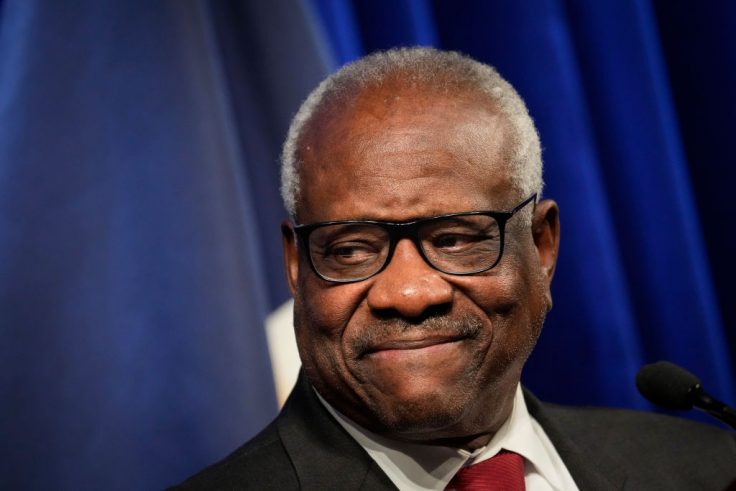The Supreme Court on Thursday recognized a constitutional right to carry firearms for self-defense for the first time, a sweeping victory for Second Amendment rights.
The justices struck down New York State's restrictions on concealed carry in a far-reaching ruling poised to undo remaining limits on the right to carry. Justice Clarence Thomas delivered the majority opinion for a 6-3 Court over dissents from the liberal trio.
The decision easily eclipses the bipartisan gun-control legislation advancing in Congress. The bill, crafted after deadly mass shootings in Buffalo, N.Y., and Uvalde, Texas, means to beef up red-flag laws, improve information sharing for background checks, and increase security at schools. For gun-control advocates, the effort is their first victory at the federal level since the 1990s. But it will be a hollow one in view of Thursday's ruling, which casts doubt on the constitutionality of numerous limits on carrying guns in public.
President Joe Biden, who is expected to sign the bipartisan gun bill, was quick to condemn the ruling. He reiterated his view that the Second Amendment ought to be a top issue in the November congressional election.
"This ruling contradicts both common sense and the Constitution, and should deeply trouble us all," he said. "I call on Americans across the country to make their voices heard on gun safety. Lives are on the line."
The Court first recognized an individual right to self-defense in the home in a 2008 case, D.C. v. Heller. In Thursday's case, New York State Rifle and Pistol Association v. Bruen, the justices said that a right they recognized over a decade ago applies with equal force outside the home.
"Nothing in the Second Amendment's text draws a home/public distinction with respect to the right to keep and bear arms," Thomas wrote.
At issue in the case is a New York "proper cause" law that requires residents to prove a special need for self-defense to obtain a concealed-carry permit. In practice, none but a favored few—former law enforcement or celebrities, for example—can prove proper cause. For example, New York City residents have to show "extraordinary personal danger, documented by proof of recurrent threats to life or safety."
Laws like New York's are becoming uncommon. Twenty-five states have "constitutional carry," or permitless concealed carry of firearms, according to the National Rifle Association's legislative arm. Only eight states restrict concealed carry with cause-based requirements like New York's. Thursday's decision casts doubt on the constitutionality of those restrictions.
Thomas's opinion establishes a new test for Second Amendment cases that is a boon to gun owners and calls into question blue state bans on "assault weapons" and home-built weapons.
Courts across the country have gladly accommodated gun regulators in recent years, upholding state-level "assault weapons" bans or sweeping transportation restrictions. In those decisions, the courts have said restrictions on gun rights outside the home are lawful so long as they advance important state interests like safety.
The Court said Thursday that approach is incorrect. Instead, courts must assess whether a given law "is consistent with this nation’s historical tradition of firearm regulation."
"Only if a firearm regulation is consistent with this nation's historical tradition may a court conclude that the individual's conduct falls outside the Second Amendment," Thomas stressed.
Using historical analogies, Thomas added, courts can sustain important public safety restrictions. For example, authorities can lawfully ban firearms from sensitive areas like schools or courthouses, he said.
New York's onerous limitations even came under attack from civil rights groups. Minorities account for a disproportionately large share of defendants in carry cases in New York State, according to an amicus brief from the Black Attorneys of Legal Aid, filed on behalf of public defenders and legal assistance groups. The brief also complained that working class minority gun-owners are priced out of the licensing system, since applications cost hundreds of dollars.
In that vein, Thomas noted that gun-control measures have a racist pedigree. In the reviled Dred Scott decision, then-chief justice Roger Taney warned that black people would have the right to carry firearms in public if the Court recognized them as U.S. citizens.
"Even Chief Justice Taney recognized (albeit unenthusiastically in the case of blacks) that public carry was a component of the right to keep and bear arms—a right free blacks were often denied in antebellum America," Thomas wrote.
Justice Stephen Breyer wrote a dissent for the three liberals that is broadly hostile to guns. The opinion canvasses statistics on suicide, accidental gun deaths, and the ubiquity of firearms to argue that courts should balance "the serious dangers and consequences of gun violence" against the Second Amendment when confronted with gun control laws.
The case is No. 20-843 New York State Rifle and Pistol Association v. Bruen.
Update 2:00 p.m.: This piece has been updated with additional information.
